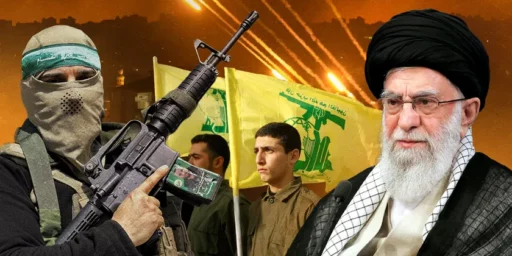Israel-Lebanon Cease-Fire Goes into Effect
The UN-sponsored Israel-Lebanon cease-fire went into effect as scheduled at 8 a.m. local/ 1 a.m. EST. So far, both sides are complying with the terms.
Israel halted its offensive against Hezbollah guerrillas as a U.N.-imposed cease-fire went into effect Monday after a month of warfare that killed more than 900 people, devastated much of south Lebanon and forced hundreds of thousands of Israelis into bomb shelters. A half hour after the cease-fire took hold, Israeli warplanes — a regular fixture in Lebanese skies during the monthlong war — were absent across huge swaths of the country, including the Bekaa Valley, where airstrikes hit about an hour before.
Thousands of cars packed with luggage and some with mattresses strapped to the roof jammed the bombed-out Zahrani highway linking the southern cities of Nabatiyeh, Tyre and Sidon, as Lebanese troops scrambled to repair roads in time for the deluge of refugees returning home. Hundreds of refugees camped out in a Beirut park packed up their belongings to return to the city’s southern suburbs.
There were no immediate reports of Hezbollah rockets being fired into Israel, a day after it fired more than 250 rockets, the worst daily barrage since fighting started July 12.
Some exhausted Israeli forces pulled out of southern Lebanon early Monday, but were being replaced by fresh troops, and the army said there will be no immediate withdrawal from positions seized in the last few days. The army said in a statement the military was told not to initiate any action after 8 a.m. (1 a.m. EST) Monday, but “the forces will do everything to prevent being hit.”
We shall see how well this holds; it would only take a couple rockets fired by a Hezbollah splinter cell to crank it back up.
UPDATE: The Jerusalem Post reports that the Olmert government is less than optimistic.
Israel intends to abide by the cease-fire when it takes effect on Monday morning, even though senior Israeli officials assume that Hizbullah will not honor it, officials close to Prime Minister Ehud Olmert said on Sunday night. The officials said the working assumption at the Prime Minister’s Office was that Hizbullah would not honor the agreement and that the world would then comprehend Israel’s predicament more than ever. At press time, the Lebanese cabinet had not given final approval to the cease-fire. “When Hizbullah violates the cease-fire, the world will see who the aggressor is and will understand us,” a source close to Olmert said. “We will insist that the agreement be implemented. It’s a good agreement for Israel and Hizbullah’s opposition is proof.”
Or proof that they believe continued fighting would be in their interest? Either way, I suspect they’re right, at least in the longer term.
And you just have to love the UN:
UN Security-General Kofi Annan sent a letter to the government over the weekend warning that if one side was fired upon, the other side should not respond except in immediate self-defense. A source in the Prime Minister’s Office called Annan’s letter unacceptable and said a team was working on a letter in response that would reiterate the IDF’s right to respond to Hizbullah if it broke the cease-fire.
One would think that axiomatic.




